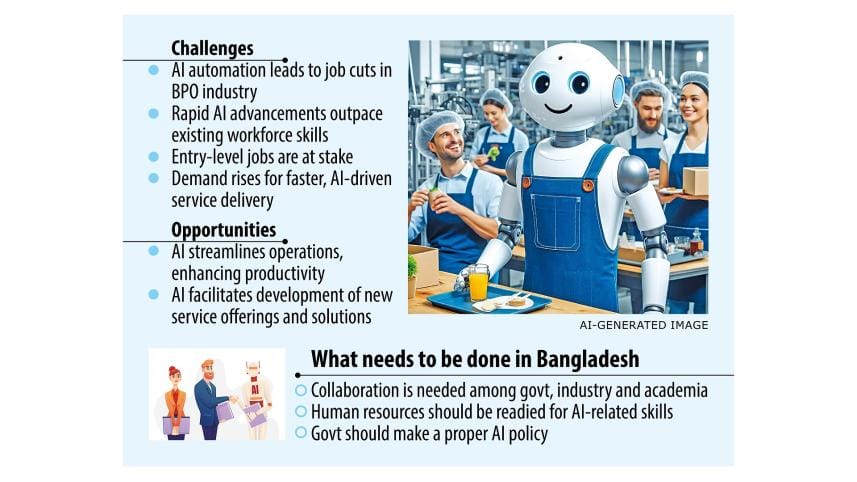AI starts to replace entry-level IT jobs in Bangladesh

It was a pretty good project for SkyTech Solutions for the last few years: generating earnings of $8.5 per hour for each of over 50 people.
The task was to process the invoice of Uber Freight services and upload the information into customer relationship management, a system that manages customer interactions, enhances satisfaction, and streamlines business processes.
But late last year, artificial intelligence (AI) knocked out more than 80 percent of the jobs in the project in a single blow.
"They informed us that the primary task will be handled by AI automation, leaving only quality control to be performed by humans," said self-made entrepreneur Musnad E Ahmed, founder of SkyTech, a leading business process outsourcing (BPO) company in Bangladesh.
Consequently, the number of employees has decreased from 55 to 10, he said.
Not only him, the BPO sector in Bangladesh was hit significantly as AI has substantially reduced job numbers by automating routine tasks like data entry and customer support.
BPO is often referred to as information technology-enabled services (ITES) because it depends on technology and infrastructure, allowing external companies to execute their tasks efficiently.
The industry people said the impact of AI-driven automation in BPO would be more devastating for Bangladesh as most people perform entry-level tasks with low-skills – something easily replaceable with AI.
AI in BPO has significantly reduced job numbers by automating routine tasks like data entry and customer support, leading to increased efficiency but substantial job cuts.
As AI technology advances, the demand for human roles decreases, transforming the employment landscape in the BPO industry.
According to Ahmed, who now employs over 700 people, the AI revolution has eliminated 30 percent of entry-level jobs from the market in the last year and a half.
"Globally, AI now handles many tasks we previously provided via voice, such as password changes. A significant portion of BPO companies' customer support, sales, and marketing services has transitioned to AI. Entry-level jobs, especially in voice services, are increasingly being taken over by AI," he said.
This transition began a year and a half ago, with a significant shift occurring last year and this year.
For example, a pizza company now can use AI to take phone orders, detailing which pizza the customers want.
According to him, as companies realised that they could replace outsourced human tasks with AI, they began preparing their platforms for this change.
Since the beginning of this year, companies are increasingly requesting secondary level jobs, such as statement processing, balance transfers, and handling confidential information -- services that require more sophisticated human resources.
Imtiaz Ilahi, managing director of the GraphicPeople, said AI is replacing the basic image processing jobs such as automated image editing, background removal etc.
Kowser Ahmed, CEO of The KOW Company, a studio image and 3D post-production company, said AI is increasing his company's productivity.
"Earlier, I could process 25,000 images, but now I can process 40,000 images with the same human resource," he said.
"So, AI is not here to take all our jobs, rather it will expedite our jobs," he added.
However, he said 20 percent to 30 percent of the jobs in a company could be lost to AI if that company cannot maintain a proper growth trajectory.
Russel T Ahmed, president of the Bangladesh Association of Software and Information Services (BASIS), said the immediate impact of AI in technology service companies is the recalculation of job hours due to AI's efficiency.
"Some of the companies that outsource their jobs from Bangladesh are reducing the man-hour -- the amount of work performed by an average worker in one hour -- as they now think AI-led automation reduces the time needed for tasks," he added.
Wahid Sharif, president of the Bangladesh Association of Contact Center and Outsourcing, said the impact of AI will be felt in entry level jobs.
"As the companies now can give the answer of basic questions and frequently asked questions with chatbots and AI technologies, they are reducing some dependency on humans," he said.
"The entry-level jobs will eventually be abolished," Sharif added.
However, he said the domestic players who provide services in Bangla face no immediate threat from AI.
"The proficiency of AI in Bangla, unlike English and other languages, has not yet developed significantly. However, in the future, AI is expected to learn Bangla, and its impact will become evident then," Sharif added.
To address the challenges faced by AI, Musnad E Ahmed, founder of SkyTech, said he is setting up a software team and planning to develop AI voice services for clients.
"We are building the software and digital marketing wings as I think no entry level tasks will exist in two years," he added.
Ahmed of BASIS said the government, industry and academia should sit as soon as possible on how Bangladesh can translate the challenges posed by AI into opportunities.
"Immediate action is necessary as AI may be making another significant leap as we speak," he added.



 For all latest news, follow The Daily Star's Google News channel.
For all latest news, follow The Daily Star's Google News channel.
Comments